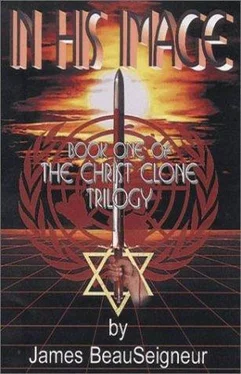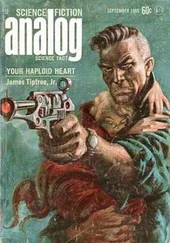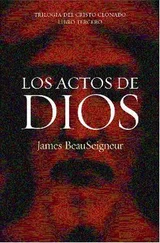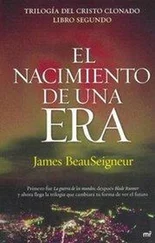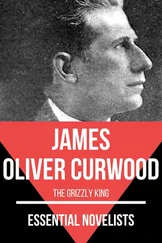Decker's eyes squinted, revealing the puzzlement behind them. "Okay, I'll bite," he said reluctantly, "how can you prove it?"
"By way of explanation," Goodman answered, "let me ask you what you know about Francis Crick."
Decker was a little resistant to Goodman's unexplained change of subject but decided to allow his old professor some flexibility and not argue the point. "I know he won the Nobel Prize in medicine back in the early '60s… "
"62," Goodman interrupted.
"… for his co-discovery with James Watson of the double helix structure of DNA. And I know he published a book a few years back… " Decker struggled to remember the name of the book.
"It was called Life Itself" 10Goodman said, finishing Decker's sentence.
"Yeah, that's it, Life Itself
"Good!" Goodman said, "then you're familiar with his book."
"I've read it." Decker tried to make it clear by his tone of voice that he didn't think much of Crick's book, but Goodman didn't seem to notice.
"All the better! You will recall that in the book Crick examines possible origins of life on this planet. He raises the question of why, with the exception of mitochondria, the basic genetic coding mechanism in all living things on earth is identical. Even in the case of mitochondria the differences are rather small. From what we know of earth's evolution, there's no obvious structural reason for the details of the coding mechanism being identical. Crick does not entirely discount the possibility that life originated and evolved naturally on earth but he offers a second theory – that perhaps life was planted on this planet by a highly advanced civilization from somewhere else. If all life on earth had a common origin, that would explain the apparent bottleneck in genetic evolution.
"Crick calls his theory 'Directed Panspermia' and it's not unlike a theory propounded by the astronomer Sir Fred Hoyle. 11Crick points out that the amount of time since the 'Big Bang' easily allows for the development of life and evolution of intelligent beings on other planets as long as four billion years ago. And that's if we take a very conservative estimate often to twelve billion years for the age of the universe. What that means is that on one or more planets in our galaxy, there may exist intelligent life which is as much as four billion years more advanced than life on earth!
10Francis Crick, Life Itself, (New York: Simon and Shuster, 1983).
11Sir Fred Hoyle and Chandra Wickramasinghe, Diseases from Space, (London: Dent, 1979).
"Professor Crick goes on to suggest that if these intelligent beings wanted to colonize other planets they wouldn't start by sending members of their own species. To colonize a planet, it would first be necessary to prepare that planet for habitation. Without plant life there wouldn't be sufficient oxygen for intelligent life, as we know it, to exist. And of course there wouldn't be food for the colonists either. To establish the needed plant life, they would have only to place some simple bacteria, such as bluegreen algae, on the planet and let evolution and the eons of time do their work."
"Professor," Decker interrupted, "I've read the book. What's the point?"
"The point is, so what if Crick is right? What if life was planted on earth by an ancient race from another planet? Where are they now? Well," Goodman continued, answering his own questions, "Crick makes several suggestions: maybe they all died; maybe they lost interest in space travel; maybe they didn't find the earth suitable for their particular needs.
"But there's another possibility Crick didn't mention."- Goodman paused to emphasize his point. "Certainly earth wouldn't have been the only planet where they would have planted life. Probably they'd have seeded thousands of planets throughout the galaxy. So, what if when they finally got to this particular planet, they found that it was already populated, and not just by plants and animals. What if, through some strange set of parallel twists of evolution, they found that it was populated by beings not far different from themselves? Would they simply invade and colonize it anyway? Or might they instead decide to observe it and let it evolve naturally?"
"Professor," Decker interrupted again, "what has all this got to do with the Shroud of Turin?"
"Think about it, Decker. Somewhere in the galaxy there may be a civilization of beings, billions of years advanced to us, who are responsible for planting life throughout the galaxy, including earth. I believe that the man whose regeneration caused the image on the Shroud of Turin was a member of that parent race, sent here as an observer: a man from a race of human-like beings, so far advanced to us that they are capable of regeneration, possibly even immortality. Not true gods – at least not in the way that term is normally used – but not too far from it."
"Haven't you heard what I've been saying?" Decker interrupted. "The Shroud of Turin is just not old enough to be the burial cloth of Christ!" Decker closed his eyes and took a long breath to gather his composure. "Professor, look," he said slowly. "This whole theory is ludicrous. And I think if you'll just stop for a second you'll realize how crazy it is. You're a scientist, and you're a good one. You know a reasonable hypothesis from a… "
"I am not crazy!" Goodman shot back. "So just cut the patronizing and hear me out!"
Decker stood up, ready to leave. "I'm sorry, Professor. You don't want me. You want someone from the National Enquirer."
Goodman stood and placed himself between Decker and the door. "I'm not nuts. I fully expected your reaction but I'm telling you I can test and prove both of these hypotheses. Damn it, I know how crazy it all sounds, but when you see what I've found on the Shroud you'll understand."
Finally, here was something solid Decker's curiosity could relate to. He no longer hoped to find the news story of the millennium, but he might at least find out what had made Goodman's conservative scientific mind turn to mush. He agreed to go to the laboratory. On the way there Decker turned to humor for relief. I'll bet he found a mustard stain, he thought, trying not to laugh at the whole ridiculous situation. Elizabeth is never going to believe this.
In the lab Goodman opened a locked cabinet and pulled out a clear plastic case with several dozen slides in it. Decker recognized it as the case of tape samples taken from the Shroud of Turin. "As I told you earlier," Goodman began, "I borrowed the slides in order to examine further the dirt particles that were found in the left heel area of the image. I hadn't even thought about the Shroud for the last few years but when it was announced that they were going to do the carbon 14 dating, it reminded me of something. I wondered if it might be possible to determine the specific chemical makeup of the particles of dirt found on the Shroud and perhaps see if any unusual characteristics could rule in or rule out given points of origin. In other words, was there anything about the dirt that would indicate that it had originated in the Middle East, or, conversely, was there anything that would instead indicate that the dirt was from either France or Italy or perhaps even somewhere else?
"If it was from the Middle East, or even from Jerusalem itself, it would not necessarily prove anything about the Shroud, of course. A forger who went to all the trouble of placing dirt on the Shroud in such minute amounts that it would take a twentieth century macroscope to see it, might just as well have thought to import the dirt from Jerusalem. It makes about as much sense, which is to say: none at all. I just wanted to get another look at it."
Goodman sat down in front of a microscope, turned on its lamp and placed a slide on the scope's stage. "In the car I told you that Dr. Heller had avoided using too much magnification because of what it was he was looking for." Goodman paused, looked through the eyepiece lens, and adjusted the scope's objectives and focus. "In my case," he continued as he looked up at Decker, "I used between a 600x and a 1000AT." Goodman stood up and motioned for Decker to look through the scope. "This first slide is the sample taken from directly over the left heel."
Читать дальше
